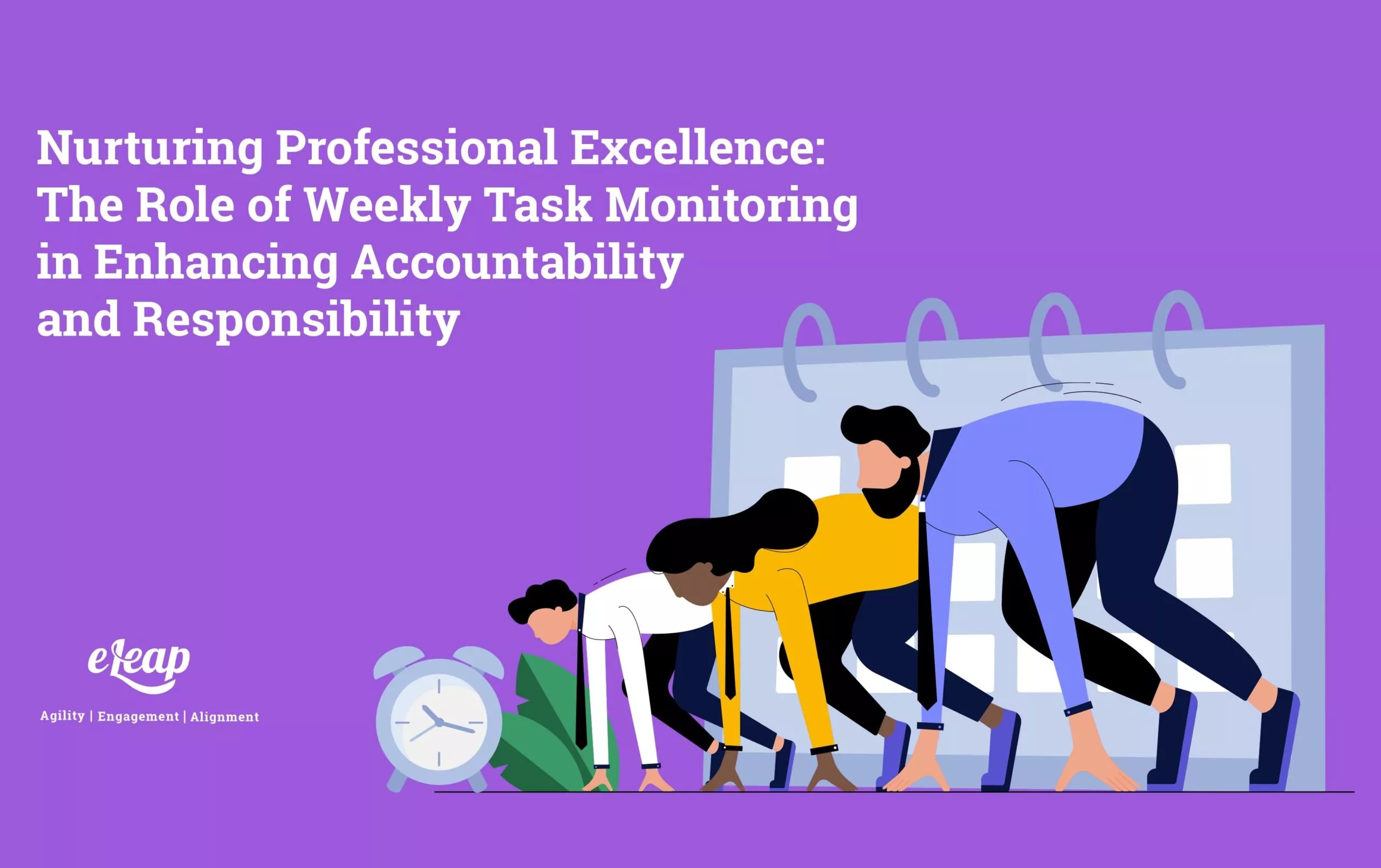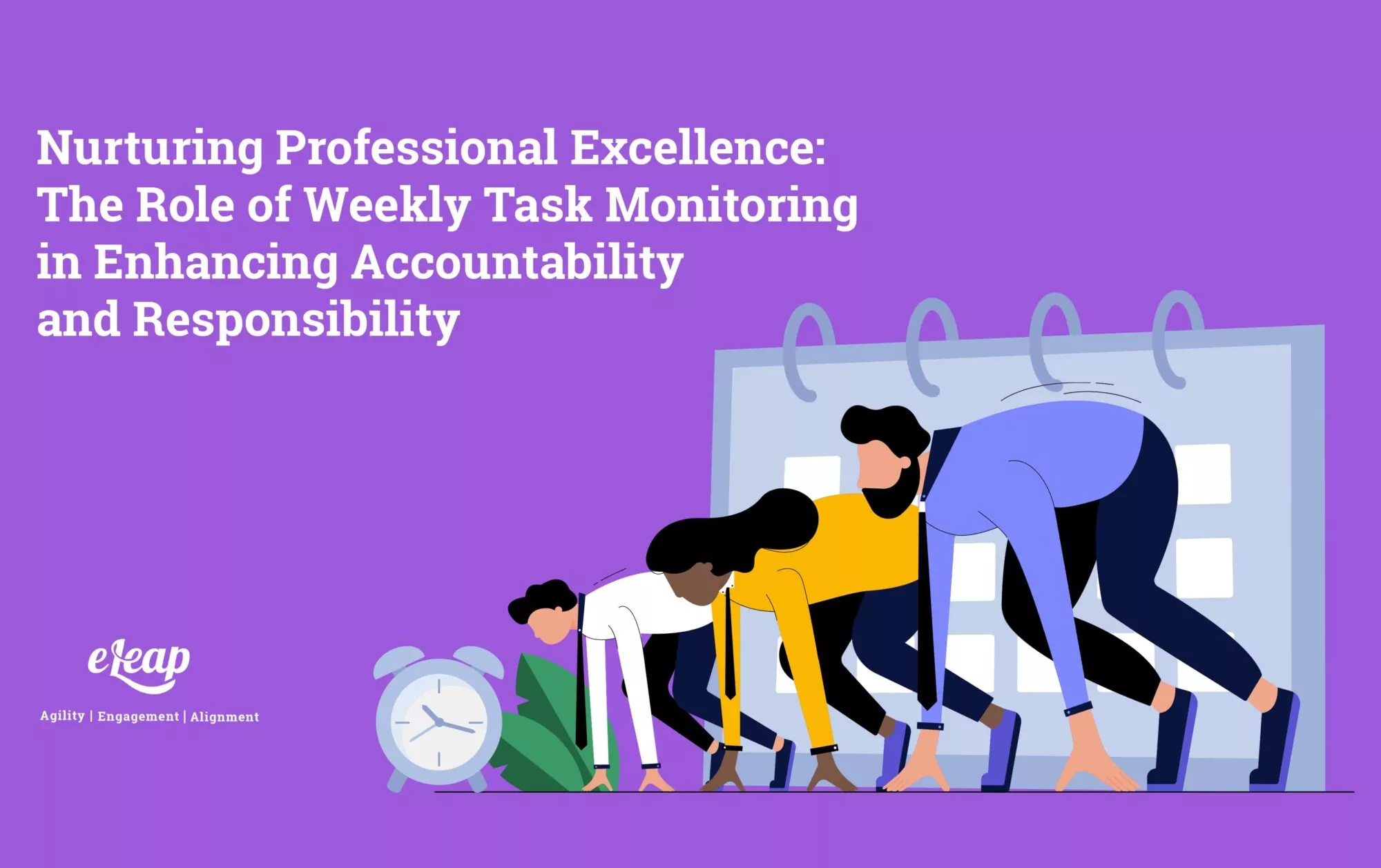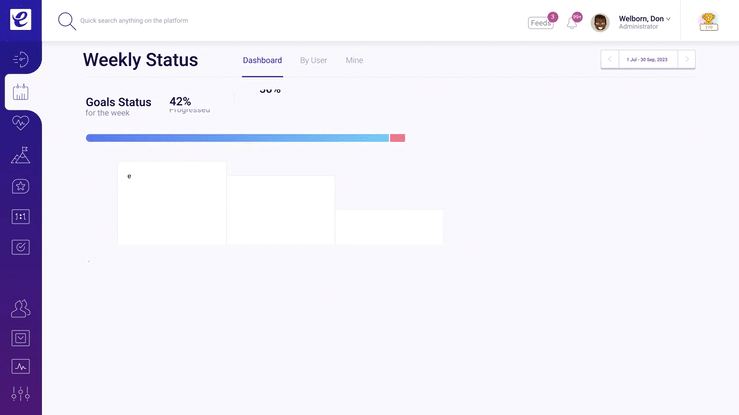Nurturing Professional Excellence: The Role of Weekly Task Monitoring in Enhancing Accountability and Responsibility

According to a study of weekly task monitoring conducted by HR DIVE, “fewer than one in five people can successfully hold others accountable for delivering on expectations in the workplace,” primarily due to the lack of a reliable feedback system. Their data revealed that 82% of managers confess their inadequacy in holding others accountable, while 91% of employees demand better accountability processes. Adding to that fact, research on accountability further shows that 69% of employees feel they are not reaching their full potential at work. Explore how eLeaP®’s PerfeLeaP®’sManagement Platform can simplify evaluations, boost productivity, and drive measurable results.

Gallup’s findings show that employees are frequently left without constructive feedback, with 26% receiving it less than once a year and 40% feeling that they are held to standards outside their control.
This bleak portrait of workplace accountability suggests that current systems may not only be ineffective but could also be actively demoralizing. The fundamental flaw lies in a process that often devolves into mere scorekeeping, inducing a negativity bias where leaders disproportionately focus on deficiencies. Such systems, which reduce complex performance into simplistic numerical ratings or labels, can leave employees feeling devalued and insecure, as a recent neuroscientific study corroborates.
In the face of such daunting statistics, one must ponder: how can organizations transform these numbers into action that empowers and motivates rather than disheartens? Where is the balance between rigorous oversight and nurturing leadership? Can introducing a Weekly Task Monitoring system and providing timely and regular feedback revolutionize professional accountability and responsibility? This systematic approach may be the key to bridging the gap between mere task completion and pursuing excellence. How can this system catalyze a profound shift towards a culture where accountability is more than a metric but a stepping stone to excellence and a measure of meaningful engagement?
Psychological Benefits of Regular Work Tracking
The psychological implications of routine work tracking for employees are substantial. When an employee’s taemployee’sgularly reviewed, it creates a sense of accountability closely tied to their professional identity and self-esteem. One critical psychological benefit is the establishment of clear expectations. When team members understand what is expected of them weekly, it reduces ambiguity, a common source of workplace stress. Clarity of purpose helps prioritize tasks and align personal goals with organizational objectives, giving a sense of shared direction and contribution.
Furthermore, regular feedback loops contribute to a growth mindset among employees. When performance metrics are clearly defined and regularly discussed, employees can more readily see their progress and identify areas for personal development. This ongoing assessment can be empowering, giving employees a sense of control over their career trajectory and personal growth. Moreover, monitoring can engender a sense of importance and belonging, as employees feel that their work matters enough to warrant attention.
Organizational Benefits of Routine Review
From an organizational perspective, weekly task monitoring can significantly enhance operational efficiency. It allows for real-time course corrections, ensuring that projects stay on track and resources are allocated effectively. The data from such reviews can inform strategic decision-making, allowing leaders to identify patterns, predict outcomes, and allocate resources more intelligently.
Routine reviews also encourage a culture of accountability. When employees know their work will be assessed regularly, they naturally maintain high standards. This sense of responsibility permeates the organization, creating an environment where everyone strives for excellence. Moreover, regular task monitoring promotes organizational transparency, strengthening trust between employees and management.
Another critical organizational benefit is reinforcing team cohesion. Regular reviews often require team members to collaborate and communicate effectively, leading to stronger relationships and better teamwork. This synergy is critical for complex projects that require coordinated efforts and can lead to higher levels of innovation as teams work together to solve problems and improve processes.
The Symbiotic Relationship Between Psychological and Organizational Benefits
In this symbiotic relationship, employees’ psemployees’l well-being fuels their engagement, which in turn drives organizational efficiency and effectiveness. Engaged employees with clarity on their weekly tasks and objectives contribute to a high-performance culture, the bedrock of sustained organizational success. This high-performance culture, characterized by clear communication and regular feedback, can significantly reduce turnover rates as employees feel more connected to their work and valued by their employers.
On the other hand, excelling organizations create the financial and cultural capital to reinvest in their human resources, nurturing a climate of continuous professional development. This investment can manifest in various forms, such as training programs, career development opportunities, and wellness initiatives, further enhancing employee satisfaction and retention.
Thus, weekly task monitoring becomes a strategic initiative that encapsulates the ethos of a learning organization—one that is adaptive, responsive, and employee-centric. By consistently aligning individual performance with organizational goals, weekly task monitoring acts as the fulcrum, balancing employee well-being with institutional progress and ensuring that each strengthens the other in a continuous loop of growth and improvement.
Principles Underpinning Effective Weekly Task Monitoring

To imbue weekly task monitoring with efficacy and to ensure it catalyzes professional development, certain principles must be embedded within its framework:
1. Dignity as the Bedrock of Interactions
Just as the annual performance review must shift from a scorekeeping exercise to a more dignified exchange, weekly task monitoring must pivot from a mechanistic check-in to a meaningful dialogue. Managers should approach these sessions with curiosity and appreciation for the employee’s efemployee’sries like, “Which of thi” week’s tasks week’su find most challenging?” or “What vi “tori” s can we celebrate?” can transfo “m these interactions into a platform for encouragement and personal connection.
2. Constructive Feedback as a Tool for Learning
Frequent monitoring allows feedback to be timely and contextually relevant. It enables managers to offer targeted insights that address immediate concerns and promote skill development. When feedback becomes a scaffold for learning rather than a mechanism for fault-finding, employees are more likely to take constructive criticism in stride and apply it to their future tasks.
3. Fairness as a Foundation for Trust
A consistent rhythm of review levels the playing field by ensuring that all team members are subject to the same frequency and quality of engagement. When employees recognize that their contributions are evaluated with a fair and consistent yardstick, trust in the system—and, in turn, their willingness to be held accountable—grows. Weekly check-ins also offer the chance to uncover and address any implicit biases that may inadvertently influence evaluations, ensuring that recognition is based on merit and contribution rather than preconceived notions.
4. Restoration as the Objective of Accountability
Should an employee falter in their weekly tasks, the subsequent discussion must be restorative, not punitive. The goal is to identify the root of the problem and work collaboratively towards a solution, transforming potential setbacks into learning opportunities. By doing so, organizations provide a psychologically safe environment where employees do not fear admitting mistakes, encouraging innovation and calculated risk-taking.
5. Autonomy and Ownership in Task Execution
Allowing professionals autonomy in completing tasks within the agreed-upon framework instills a sense of ownership and pride in their work. Therefore, Weekly task monitoring should not be prescriptive but a checkpoint to offer guidance and support. By engaging in discussions about task management and personal work styles, employees are often empowered to discover and implement strategies that enhance their productivity and quality of work.
6. Celebrating Successes and Lessons Learned
Each weekly meeting is an opportunity to celebrate successes, no matter how small, which can significantly boost morale and motivation. Acknowledging the hard work of completing tasks reinforces the importance of every team member’s contmember’s. Equally important is the discussion of lessons learned from functions that did not go as planned, embracing an environment that values growth and understanding over perfection.
Conclusion
The findings from HR DIVE and Gallup are stark, highlighting a palpable need for Weekly Task Monitoring to enhance accountability and harness the workforce’s fworkforce’sal. By establishing a rhythm of regular, constructive feedback. This system directly addresses the deficits laid out by research—engendering a workplace where expectations are clear, achievements are recognized, and every task is an opportunity for growth. It’s a delibeIt’s shift from the traditional, often discouraging feedback models to one that views accountability as a shared journey toward professional excellence.
Implementing Weekly Task Monitoring transcends simple oversight; it invests in the organization’organization’seople’s growpeople’snsures that every cog in the machine is attuned, the company’s goacompany’searly visible, and that employees are heard, actively listened to, and developed. As both a strategic tool and a cultural cornerstone, Weekly Task Monitoring is a steadfast ally in the quest for a workplace that thrives on responsibility, celebrates progress, and turns potential into reality.
Elevating Organizational Growth with eLeaP
Since its inception in 2002, eLeaP has been trying to transform workplaces. With our robust Learning Management System (LMS) and Performance Management Platform (PMP). eLeaP crafts environments where engagement and performance soar, and skills are sharpened with precision.
Recognitions such as the Capterra Award and the eLearning Industry’s ToIndustry’sebsite Designs Award speak to eLeaP’s commieLeaP’so excellence. A standout feature is the Weekly Status Task & Collaboration System, which offers a streamlined and practical approach to monitoring and encouraging employee progress. It is an invaluable resource for any organization seeking to solidify a success and continuous improvement foundation.